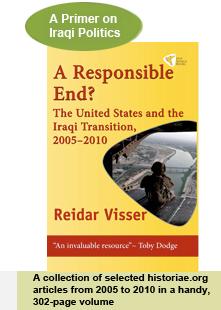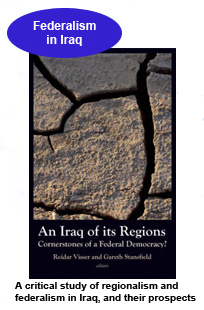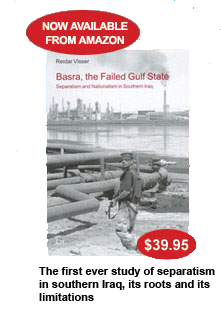



| Main | |
| Documents & images | |
| Links | |
| Contact | |
 | |
| amazon.com |

|
|
|
amazon.com
amazon.co.uk |
|

|
|
|
amazon.com
amazon.co.uk |
|
Maliki Re-Launches the State of Law List: Beautiful But Is It Powerful Enough?
By Reidar Visser (www.historiae.org)
1 October 2009
Today, Prime Minister Nuri al-Maliki has put together a new line-up for his State of Law (dawlat al-qanun) list that will contest Iraq’s parliamentary elections in January 2010. In terms of Iraq’s maturation from a sectarian to an issue-based kind of politics, Maliki’s list represents considerable progress, although it was not quite as wide-ranging as some had hoped for.
Before discussing the potential of the new iteration of the State of Law coalition, it can be useful to recap what the previous version was and what it wasn’t. True, Maliki’s electoral performance last January was impressive, and his wins in the two big cities of Basra and Baghdad stood out in particular. But despite all the spin, the composition of his list back then was still heavily Shiite Islamist, with most leading candidates coming from the two main branches of the Daawa and the bloc of independent Shiite parliamentarians affiliated with the oil minister, Husayn al-Shahristani. Also, its electoral performance in areas north of Baghdad without Shiite majorities was dismal, with just a couple of percent of the votes at best; on the whole, Sunni votes for Maliki materialised in few areas outside Basra and Baghdad. Whilst sometimes described in Western media as a new, anti-Iranian and even secular strongman of Iraq, Maliki in reality had won an ambiguous victory that was subsequently reflected in problems of coalition-forming and considerable kowtowing to hardliner Islamist demands by some of his local councillors in both Basra and Baghdad.
Since the local elections in January, Maliki’s political strategy to boost his chances of winning the next parliamentary polls has apparently followed two tracks. The first is to expand the range of parties that take part in his coalition, especially to bring in more secularists and Sunnis. At its bravest, back in March, this included talks with the secularist Salih al-Mutlak and cooperation with the secular Iraqiyya list in several provincial councils, reflecting the fact that on many key issues relating to the design of the optimal basic state model for Iraq, Maliki’s centralist ideals correlate fairly well with the preferences of the secularist parties. It also involved more recently a long overdue rapprochement with other nationalist forces associated with the 22 July trend that grew out of opposition to Kurdish policies in Kirkuk and today is embodied primarily in the Nationalist Independent Trend headed by Mahmud al-Mashhadani and Nadim al-Jabiri (which also includes certain Sadrist breakaway members), but which also has a certain affinity to local movements like the Hadba list in Mosul headed by the Nujayfi brothers, the independent Yusuf al-Habubi in Karbala, and the Iraqi Constitutional Party of the minister of interior, Jawad al-Bulani. Another new idea in Daawa circles over the summer consisted of reaching out to reformist forces in Kurdistan, which recently have been empowered by growing Kurdish dislike of the stranglehold of their two biggest parties (as witnessed for example in the regional elections there in July).
On this dimension, the roster of parties that were reported today as actually having signed up for the new State of Law coalition seemed to include a good deal of second-best leftovers. There appears to be no Iraqiyya, no Hiwar, no Nujayfi, no Habubi (although some reports say his new-found partner of the Dulaym tribe, Ali Hatim Sulayman, was present), no Mashhadani, no Jabiri, no Bulani and apparently even no Ahmad Abu Risha (the Anbar leader with whom Maliki appeared to have a tacit alliance at the time of the last local elections – whilst he is referred to in one Western newswire report, there is no mention of him in the Daawa press release from the launch). Instead, in addition to the expected Daawa/Shiite Islamist core (this includes the main faction of the Tanzim al-Iraq branch), there are a collection of breakaway elements. For example, from the Iraqiyya coalition there are defectors such as the Iraqi Communist Party, as well as independent representatives like Mahdi al-Hafiz and Safiya al-Suhayl (who are sometimes described as defectors and sometimes as casualties of expulsions). Similarly, there are splinter elements with a past association with Hiwar or the 22 July trend generally, like Abbad Mutlak al-Jibburi, and ex-Tawafuq members with links to Kirkuk like Hajim al-Hasani, and Sunni tribal figures who have tried to cooperate with Shiite Islamists earlier, such as Khalid al-Yawir. The presence of a Fayli party will probably be highlighted as a new “Kurdish” dimension although it has to be stressed that many Faylis have a fairly distinct sense of separate identity also rooted in their Shiite links. Jaafar al-Sadr, another figure now highlighted by the new coalition, is the only son of Muhammad Baqir al-Sadr, Iraq’s iconic
clerical activist in the 1970s. In the late 1990s he was involved in creating an office for the Sadrist movement in Iran and may perhaps appeal to some in the Sadrist camp for that reason, although his personal relations with Muqtada have been poor at times.
We should however keep in mind the second track of Maliki’s overall strategy in building support, which is less in the news and therefore less easy to keep track of. Basically, it consists of strengthening Daawa influences in local communities also outside the field of electoral politics. Back in the last local elections, this became controversial with respect to the so-called “support councils” (majalis isnad), associations of supposedly unarmed tribesmen with somewhat elusive mandates aimed at “strengthening the state” in the local community. More recently, there has been an increasing focus on the efforts of the Daawa party to install individuals loyal to themselves in the Iraqi public bureaucracy. This dimension may well be part of the new coalition effort too, as it is difficult to know exactly who the unnamed tribal participants from various governorates north of Baghdad are and how much influence they actually have. But anecdotal evidence suggests that this process is ongoing; as recently as yesterday a high-level defection from Hadba to the State of Law list was reported in the Sinjar area in Nineveh province.
On the balance, then, the new list is a courageous move by Maliki, but there is still a feeling that one or more additional elite allies from the secular or Sunni-oriented parties could be needed for a big success. For sure, just the mere fact of going it alone, separate from the Shiite-dominated Iraqi National Alliance, is in itself a brave choice. The new list is very different from the Iraqi National Alliance in that it looks less sectarian – the Sunnis and secularists in it seem like real representatives in the total picture, whereas in the Iraqi National Alliance they come across as ornaments that will never have real influence – and it has got more ideological coherence, focused on the vision of a functioning centralised government in Iraq. It seems clear that Maliki is determined to get out of his dysfunctional relationship with the anti-centralist groups (especially the Islamic Supreme Council and the Kurds) that currently make up his cabinet. Vague talk of “super-alliances” between the two coalitions in the future cannot detract from the fact that Maliki’s decision to go it alone was something neither the Iraqi National Alliance nor Iran wanted.
On the other hand, it seems that a series of recent unfortunate events, most of which were probably not of Maliki’s own making, may have helped sour his relationship with potential Sunni and secularist allies. In the first place, there was the “Black Wednesday” bombings in August and the subsequent drive by Maliki to accuse Syria and Baathists, which may have alienated some prospective allies. This whole development is slightly ironic in that criticising Baathists and neighbouring Arab states for a long time has been the preserve of ISCI but on this occasion they stood back and let Maliki go all the way. Secondly, there was the conflict with Abd al-Karim Khalaf, a top-level ministry of interior official who in the past has been considered an astute nationalist by many secular Iraqis. And of course, there was the case of Muntazar al-Zaydi who became a nationalist hero in the shoe-throwing incident last year where Maliki was standing rather uncomfortably shoulder to shoulder with George W. Bush; his recent release from prison prompted accusations of highhanded action by Maliki’s security detail in the past. Whilst at least two of these conflicts may ultimately well be the results of intrigues by his enemies in the Shiite camp who had wanted him to join their coalition, Maliki needs to remember that he cannot afford to alienate too many secularists and people with a degree of pan-Arab sympathies either. After all, the magnitude of his victory in the last local elections was caused primarily by watershed victories in urban areas where Iraqis saw him as an inspirational figure; the other strategy of building tribal support in the countryside did not produce such convincing results in terms of votes for the State of Law list.
And so the next few weeks will probably see the most decisive developments. What will happen to the rumoured negotiations between the Iraqi National Alliance and Iraqiyya? How will the question of Kirkuk in the elections law affect the coalition-forming process? Will more Iraqi nationalists see the potential strengths of the State of Law list and join, or will they use the opportunity to coalesce into a third big coalition? Unfortunately, some may well feel inclined to choose the unrealistic alternative of dreaming about a solo win, in which case it will be fairly easy for Iran to create conditions conducive to the re-formation of a Shiite sectarian majority come January 2010. But with his new list, Maliki has at least made a tentative step and a bold contribution towards extricating Iraq from the politics of sectarianism.
Copyright © 2005-2009 historiae.org & Reidar Visser
This document or quotes from it may be freely reproduced as long as www.historiae.org is credited as the original source.
